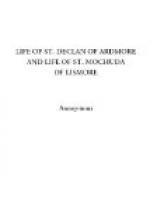Next, the nobles present cast lots to decide which one of them should go with the king to lay hands on Mochuda and expel him from the monastery. The lot fell upon the Herenach [hereditary steward] of Cluain Earaird. He and the king accompanied by armed men went to the monastery where they found Mochuda and all the brethren in the church. Cronan, a certain rich man in the company, shouted out, “Make haste with the business on which you are come.” Mochuda answered him—“You shall die immediately, but on account of the alms which you gave me for the love of Christ and on account of your uniform piety heretofore your progeny shall prosper for ever.” That prophecy has been fulfilled. Another man, Dulach by name, winked mockingly with one of his eyes; moreover he laughed and behaved irreverently towards Mochuda. Mochuda said to him: —“Thus shall you be—with one eye closed and a grin on your countenance —to the end of your life; and of your descendants many will be similarly afflicted.” Yet another member of the company, one Cailche, scurrilously abused and cursed Mochuda. To him Mochuda said:—“Dysentery will attack you immediately and murrain that will cause your death.” The misfortune foretold befell him and indeed woeful misfortune and ill luck pursued many of them for their part in the wrong doing. When the king saw these things he became furious and, advancing—himself and the abbot of Cluain Earaird—they took each a hand of Mochuda and in a disrespectful, uncivil manner, they led him forth out of the monastery while their followers did the same with Mochuda’s community. Throughout the city and in the country around there was among both sexes weeping, mourning, and wailing over their humiliating expulsion from their own home and monastery. Even amongst the soldiers of the king were many who were moved to pity and compassion for Mochuda and his people.
One of Mochuda’s monks had gout in his foot and for him Mochuda besought the king and his following that he, as he was unable to travel, might be allowed to remain in the monastery; the request was, however, refused. Mochuda called the monk to him and, in the name of Christ, he commanded the pain to leave the foot and to betake itself to the foot of Colman [Colman mac hua Telduib, abbot, or perhaps erenach only, of Cluain Earaird], the chieftain who was most unrelenting towards him. That soreness remained in Colman’s foot as long as he lived. The monk however rose up and walked and was able to proceed on his way with his master.
There was an aged monk who wished to be buried at Rahen; Mochuda granted the request, and he received Holy Communion and sacred rites at the saint’s hands. Then he departed to heaven in the presence of all and his body was buried at Rahen as he had himself chosen that it should be.




